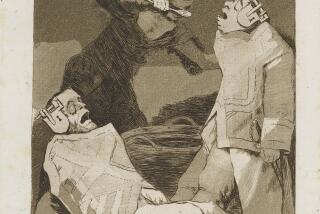Joan Gussow looks at life and loss
- Share via
Joan Gussow has long had a reputation for speaking her mind as an early advocate of local food and as a professor warning about how our eating habits will affect the environment and our health.
As she begins her ninth decade, Gussow has written a memoir, “Growing, Older: A Chronicle of Death, Life, and Vegetables,” in which she cries for the future of the planet but finds herself disturbingly not in mourning over the death of her husband of 40 years, just five months after his cancer diagnosis.
In fact, the book was inspired in part by her struggle to cope with her discovery that she did not miss her husband, artist Alan Gussow.
She was 68 when he died, and she writes: “For most of those 40 years, I lived a truly happy life. The surprise was that so little of my happiness had depended on Alan.”
“Growing, Older” is partly about survival — of her garden and of herself, as a widow, a mother of two grown sons and a mostly retired professor at Teachers College, the graduate school of education at Columbia University, making her way into what she calls “the third trimester” of life.
In some circles, Gussow, 82, is an icon who has inspired the likes of Michael Pollan and Alice Waters. The author of “This Organic Life,” she was a member of the National Organic Standards Board. The Alhambra native has gardened along the Hudson River for decades, and the only vegetables she eats are those she grows.
Her book is an honest accounting that roams from her husband’s death to her aging and mortality, to her relationship with the natural world, especially that part of it outside her Piermont, N.Y., home.
Joan Dye and Alan Gussow had plenty in common. They began a community garden next to their home. They shared political beliefs and a strong connection to the Earth. In an interview, Joan Gussow described her husband’s ink drawing called “The Carrots Are Up.”
“It was just perfect,” she said. “It’s just how it was. He was very closely observing nature. He wrote a book called ‘A Sense of Place,’ about how artists have a responsibility to the landscape.”
But for all that, they had fundamentally different world views. She saw a world in peril that demanded environmental action, she said, and ultimately her husband did not.
Friends encouraged her to write about her feelings — the embarrassment and bewilderment she felt over not having a profound sense of loss after his death — and her journey to understand the striking philosophical differences between her and her husband.
“It was extraordinarily hard to write because I didn’t want to trash him. I didn’t want to say he was the villain,” Gussow said by phone from her home.
At a reading to about 100 people at a garden club event, Gussow said, when she read about her reaction to her husband’s death, the audience burst out laughing — in recognition.
“I wasn’t at all sure how people were going to react. It’s quite stunning,” she said.
“I’ve tapped into something larger than me.”
And all of this — Gussow’s insistence on living an examined life included — goes hand in hand with her gardening. One reason her home didn’t seem empty after her husband’s death: “As a gardener, I had life all around me. It’s just that most of it was not human.”
Gardening, she said, is healing.
Her life sounds appealing but not easy. Sometimes — like the effort to rid her garden of a persistent woodchuck, an effort that required trapping and freeing skunks, reinforcing chicken wire and more — Gussow’s labors seem enormous. But she always finds that nature pays her back, if not in food, then in knowledge gained.
Gussow has railed against industrial food and depressed her students by “telling them about human-induced threats to the biosphere,” she writes. Still, for years she didn’t fully accept “the fact that we might wipe out the remembered round of seasons.”
Then something she read changed her. “After 10 years as a teacher, I had suddenly internalized the implications of what I had been saying in the classroom,” she writes.
“I cried for a couple of days. It was very hard. It is very hard to accept it,” she said. But after she accepted reality, she felt liberated to “face it and try to live your life as best you can.”
So she tries to live slowly and carefully, attending to nature.
But Gussow is no garden pushover: She does battle floods, muskrats and harlequin beetles. Yet her love of her garden remains steadfast: “For working in the garden produces more than exercise; it produces strength, joy, hope, a tan, natural beauty, vegetables, and, in Frances Hodgson Burnett’s words, a future.”
Joan Gussow is scheduled to appear in New York, Connecticut, Maryland, Pennsylvania, Ohio and Northern California. She also is the keynote speaker at the Edible Institute conference in Santa Barbara on Jan. 29.
More to Read
Sign up for our Book Club newsletter
Get the latest news, events and more from the Los Angeles Times Book Club, and help us get L.A. reading and talking.
You may occasionally receive promotional content from the Los Angeles Times.









